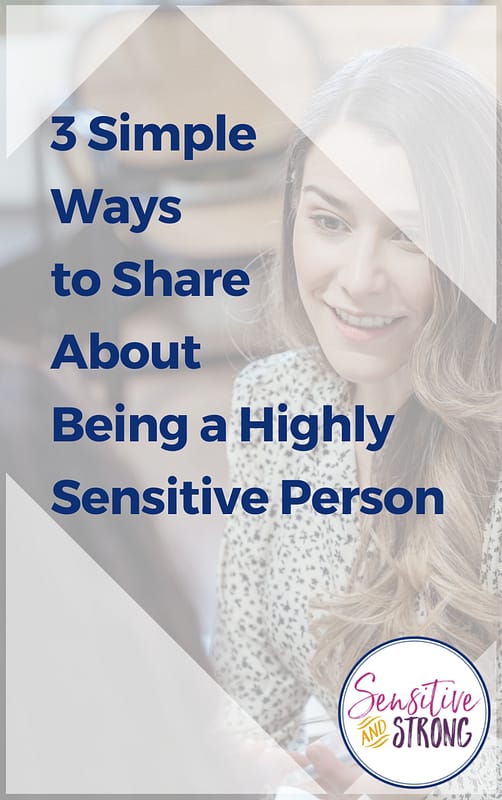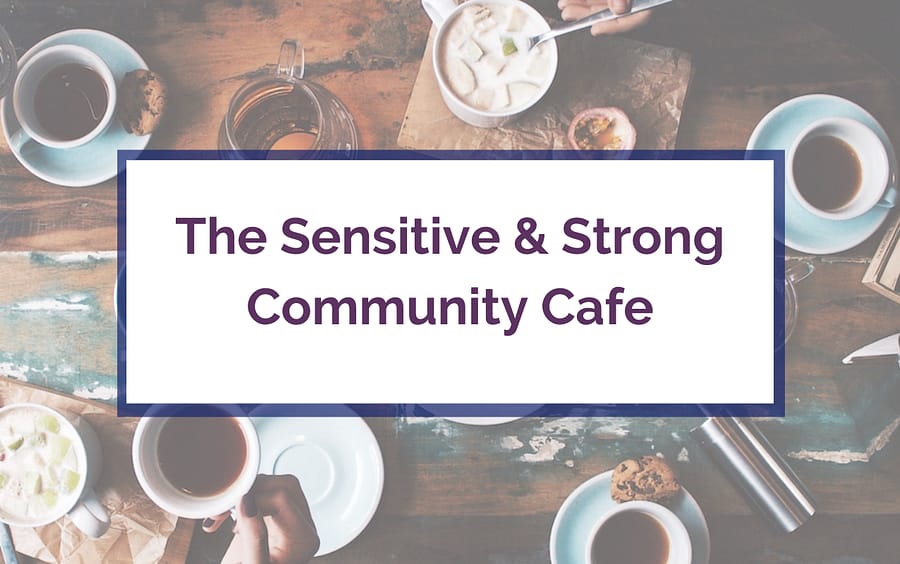3 Simple Ways to Share about Being a Highly Sensitive Person
“Growing Sensitive & Strong” is the life-changing program that moves you from “What’s wrong with me?” to comfortable and confident in who God made you as a Highly Sensitive Person.
To be the first to know when Early Bird Registration for our summer session begins, you can add yourself to the Waiting List right here.
Whenever I try to tell someone what it means to be a Highly Sensitive Person my words never seem to come out right. Based on their response, I can tell that they end up with wrong ideas about HSPs. Based on your experience, what can I say that will actually communicate clearly? And what should I make a point NOT to say?
The question above comes from a new feature called “Ask Your Coaches” in the Sensitive & Strong Community Cafe.
Below you’ll find three unique responses from three of the Cafe‘s coaches:
From Cheri Gregory — your HSP Growth Coach
I’ve learned to check in with my own wants and needs before sharing about being an HSP.
Am I feeling defensive? desperate to be understood? Do I want to correct the other person? prove them wrong about me? Is there a particular reaction I’m trying to get from the other person? What will happen if they react differently?
Or am I feeling relaxed and safe? Excited to share something important to me … and at peace with whatever response I do (or don’t) get?
Words and phrases that I’ve found helpful include:
-
field of research
-
temperament
-
trait
-
genetic
-
at the “DNA level”
-
Sensory Processing Sensitivity
These clinical words and phrases start the conversation at an intentionally impersonal level. Since we aren’t talking about me and my own experience — we’re talking about the concept of being a Highly Sensitive Person — I’m less likely to take any skepticism or ridicule personally. And I can drop the subject with relative ease.
(Whereas if I’m trying to explain myself and validate my own personal experience, I can start talking too much and too fast and too loudly, becoming more and more desperate to be understood.)
You’ll find other important words and phrases in “The 5 Key Qualities of a Highly Sensitive Person” videos you receive when you join the Sensitive & Strong Connection newsletter list.
Beware of the urge to share with anyone you want to impress or who has a history of being critical of you. Start by sharing with people who qualify as “Cheerleaders” and “Safe People” on The Safety Sorter.
And always feel free to head into the Cafe Prayer Circle to ask for prayer before sharing … and to pray-cess after!
In His Delight,
Cheri Gregory
aka “Gentle Person”
From Leslie Newman — your Better Boundaries Coach
There are many ways to share what it means to be a Highly Sensitive Person, and each of us will likely develop our own special way of communicating about it.
It’s important to remember that clear communication starts before the words are even spoken.
Here are some lessons I’ve learned along the way.
1. Pray about the timing.
In my zeal to share HSP with others, I have often initiated the conversation too soon. If I have not spent much time with someone, I have not actually had the time to notice patterns in their life. This means there’s a possibility I’m making assumptions.
Trust is important in new friendships. When the two of us are new friends, neither of us has had the time to build real trust between each other. When I share before the trust has been developed, I’ve noticed that I’ve opened up a space where the other person can feel as if I’m labeling them in some way.
My great desire to help others close to me understand me better has also led me to share too soon. Had I waited, I believe those initial conversations would have gone more smoothly as I would have had a better grasp on how and when to introduce HSP.
In all of these cases, I believe the prayers I didn’t pray would have helped those conversations in some way. Prayer always makes a difference, even when conversations don’t turn out as we had hoped they would.
2. Communicate in bite-sized pieces.
It’s easier to communicate more clearly when we’re not sharing so much information all at once. Sharing in smaller pieces slows the process down. This gives us more time to find the right words. It also creates more time for the other person to process and understand what we are sharing.
When we share across several conversations, we are also creating space for prayer to happen as we go along. Again, prayer will make a difference.
3. Separate yourself from the reactions of others.
If you share HSP with others, you will find that some will not give you the response that you hoped for. This hurts, especially when it comes from a loved one.
There’s no need to continue having conversations with people who are dismissive or who are invalidating you as you share. In this case, they are either not ready for the information — or they are unwilling in some way to receive it.
This is not about you. It’s about where they are. It’s always OK at any point to let the conversation go and move on. We can’t control another person’s reaction. We can, however, learn that other people’s reactions do not define us.
When we learn to stand strong as an individual, we will continue to be able to communicate about HSP when the Holy Spirit prompts us.
Standing strong in the beautiful way that God created you is something you can do. All of your HSP qualities working in tandem are what God has given you to help you communicate clearly, deeply, and with just the right timing!
Blessings,
Leslie Newman
From Sarah Marie Sonoda — your Well-Being “Systems Check” Coach
This has been a challenge when first knowing the term and attempting to “HSPlain” myself to not-so-safe family members. I feel the need to be understood and belong, and I do — HERE in the Cafe.
The largest understanding shifts have come by explaining what SPS (Sensory Processing Sensitivity) is. I also share the differences between SPS and SPD (Sensory Processing Disorder).
Most people understand the word “stimuli” easier than “sensitive”. Sensitive (in my life) shifts the conversation to what they perceive as a weakness and something that requires me to “get over it” or “toughen up”. Stimuli is a word that is very well received. People understand the words “adrenaline jolt” and what chemical reactions cause the hyper-reactivity that may result when I am overstimulated.
I have found that some confusion comes when I don’t react to the same stimuli the same way every time. This has caused people to walk on eggshells and become overly-attentive, which is the opposite of what I need to calm my reactivity in that moment.
What they are coming to realize, through their own research, is that their need to control my reactivity is (at times) the reason why I get triggered. Proper, well-stated boundaries have helped significantly.
When I explain that this is woven into my DNA by God for His purpose, the conversations shift. When boundaries are purposefully breached, I restate said boundary and keep moving forward … until the next trauma is triggered. Rinse and repeat.
Personal boundaries prepare safe space to communicate clearly. When I’m over-stimulated, my words rarely come out clear because the “buzzing” (frenzied head space) leads to lack of listening which halts the conversation.
Taking the tangled thoughts and feelings to God first allows Him to curate when the time is right/safe to share.
Big hugs my HSPrecious Sister — you are not alone.
In His Care Always,
Sarah Marie Sonoda
If you’ve enjoyed this “Ask Your Coaches” blog post, you’d love being a member of the Sensitive & Strong Community Cafe!
I am grateful for this community because here we can talk, learn from each other, encourage each other, and grow together.
~ Cafe Member
Being a part of this community has been very helpful. I don’t ever feel alone and if I don’t want to interact for awhile it’s okay and there is no judgment! I love that! I feel blessed to have this community and be heard and feel appreciated and valued. Thank you for this.
~ Cafe Member





